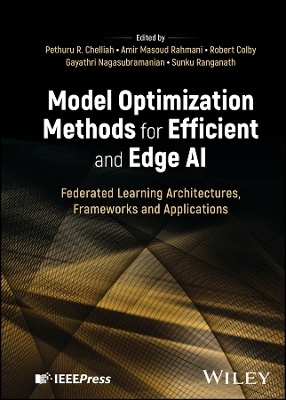
Model Optimization Methods for Efficient and Edge AI
Federated Learning Architectures, Frameworks and Applications
Seiten
2025
Wiley-IEEE Press (Verlag)
978-1-394-21921-6 (ISBN)
Wiley-IEEE Press (Verlag)
978-1-394-21921-6 (ISBN)
- Noch nicht erschienen (ca. März 2025)
- Versandkostenfrei innerhalb Deutschlands
- Auch auf Rechnung
- Verfügbarkeit in der Filiale vor Ort prüfen
- Artikel merken
Comprehensive overview of the fledgling domain of federated learning (FL), explaining emerging FL methods, architectural approaches, enabling frameworks, and applications
Model Optimization Methods for Efficient and Edge AI explores AI model engineering, evaluation, refinement, optimization, and deployment across multiple cloud environments (public, private, edge, and hybrid). It presents key applications of the AI paradigm, including computer vision (CV) and Natural Language Processing (NLP), explaining the nitty-gritty of federated learning (FL) and how the FL method is helping to fulfill AI model optimization needs. The book also describes tools that vendors have created, including FL frameworks and platforms such as PySyft, Tensor Flow Federated (TFF), FATE (Federated AI Technology Enabler), Tensor/IO, and more.
The first part of the text covers popular AI and ML methods, platforms, and applications, describing leading AI frameworks and libraries in order to clearly articulate how these tools can help with visualizing and implementing highly flexible AI models quickly. The second part focuses on federated learning, discussing its basic concepts, applications, platforms, and its potential in edge systems (such as IoT).
Other topics covered include:
Building AI models that are destined to solve several problems, with a focus on widely articulated classification, regression, association, clustering, and other prediction problems
Generating actionable insights through a variety of AI algorithms, platforms, parallel processing, and other enablers
Compressing AI models so that computational, memory, storage, and network requirements can be substantially reduced
Addressing crucial issues such as data confidentiality, data access rights, data protection, and access to heterogeneous data
Overcoming cyberattacks on mission-critical software systems by leveraging federated learning
Written in an accessible manner and containing a helpful mix of both theoretical concepts and practical applications, Model Optimization Methods for Efficient and Edge AI is an essential reference on the subject for graduate and postgraduate students, researchers, IT professionals, and business leaders.
Model Optimization Methods for Efficient and Edge AI explores AI model engineering, evaluation, refinement, optimization, and deployment across multiple cloud environments (public, private, edge, and hybrid). It presents key applications of the AI paradigm, including computer vision (CV) and Natural Language Processing (NLP), explaining the nitty-gritty of federated learning (FL) and how the FL method is helping to fulfill AI model optimization needs. The book also describes tools that vendors have created, including FL frameworks and platforms such as PySyft, Tensor Flow Federated (TFF), FATE (Federated AI Technology Enabler), Tensor/IO, and more.
The first part of the text covers popular AI and ML methods, platforms, and applications, describing leading AI frameworks and libraries in order to clearly articulate how these tools can help with visualizing and implementing highly flexible AI models quickly. The second part focuses on federated learning, discussing its basic concepts, applications, platforms, and its potential in edge systems (such as IoT).
Other topics covered include:
Building AI models that are destined to solve several problems, with a focus on widely articulated classification, regression, association, clustering, and other prediction problems
Generating actionable insights through a variety of AI algorithms, platforms, parallel processing, and other enablers
Compressing AI models so that computational, memory, storage, and network requirements can be substantially reduced
Addressing crucial issues such as data confidentiality, data access rights, data protection, and access to heterogeneous data
Overcoming cyberattacks on mission-critical software systems by leveraging federated learning
Written in an accessible manner and containing a helpful mix of both theoretical concepts and practical applications, Model Optimization Methods for Efficient and Edge AI is an essential reference on the subject for graduate and postgraduate students, researchers, IT professionals, and business leaders.
Pethuru Raj Chelliah, PhD, is the Chief Architect of the Edge AI division of Reliance Jio Platforms Ltd. (JPL), Bangalore, India. Amir Masoud Rahmani, PhD, is an artificial intelligence faculty member at the National Yunlin University of Science and Technology, Taiwan. Robert Colby is a Principal Engineer in IT Infrastructure responsible for Manufacturing Network Architecture and IoT Infrastructure at Intel Corporation. Gayathri Nagasubramanian, PhD, is an Assistant Professor with the Department of Computer Science and Engineering at GITAM University in Bengaluru, India. Sunku Ranganath is a Principal Product Manager for Edge Infrastructure Services at Equinix.
| Erscheint lt. Verlag | 3.3.2025 |
|---|---|
| Sprache | englisch |
| Themenwelt | Informatik ► Theorie / Studium ► Künstliche Intelligenz / Robotik |
| Mathematik / Informatik ► Mathematik ► Angewandte Mathematik | |
| Mathematik / Informatik ► Mathematik ► Finanz- / Wirtschaftsmathematik | |
| ISBN-10 | 1-394-21921-0 / 1394219210 |
| ISBN-13 | 978-1-394-21921-6 / 9781394219216 |
| Zustand | Neuware |
| Haben Sie eine Frage zum Produkt? |
Mehr entdecken
aus dem Bereich
aus dem Bereich
Buch | Softcover (2024)
REDLINE (Verlag)
20,00 €
Eine kurze Geschichte der Informationsnetzwerke von der Steinzeit bis …
Buch | Hardcover (2024)
Penguin (Verlag)
28,00 €


